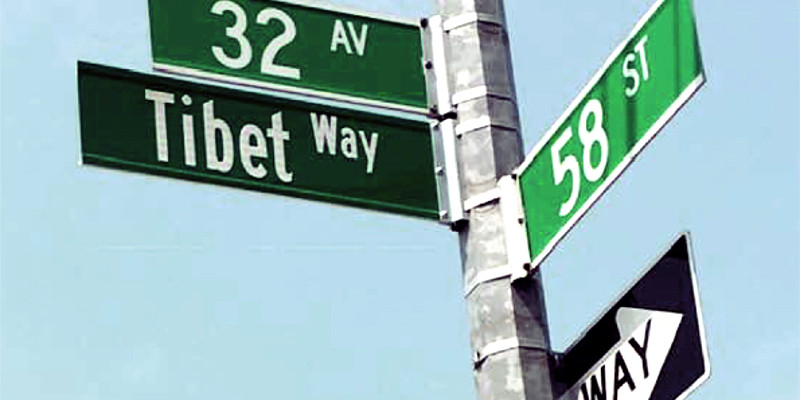Few years ago, when I was driving up the hills of Ithaca towards Cornell university, I stumbled upon a street name out of the blue called the Tibet Road. A quiet corner of a single lane road it was, surrounded by the usual quietness of the nature and probably punctuated by the frequent crossing of deer. But to see a road, any road regardless being named after my lost country Tibet was heartwarming to say the least.
Ever since Tibet lost its independence, thousands who followed HH across the Himalayas settled mostly in India. Fast forwards little less than four decades later, into the mid nineties, many of the Tibetans born as refugees in India including myself, now ripened to enter the job market after good education was awaited with a dismal future as far as getting a job in Indian civil administration. And now with little choice left and desperation caving in, many are left to follow on the footsteps of their parents into selling sweaters on the plains of India in the winter months. The others who didn’t have their parental business to follow would soon see their future fold into darkness. Hence the quest for the west started.
Further accentuated by the uncertainty of the political future with the aging of HH and the shifting of India’s policies against Tibet’s geopolitical relevance and the often snubbing of Tibet related events to appease China, created the perfect storm for the Tibetans to avoid and so the dream to fly to the Western Hemisphere took flight.
The collateral effects of this has fueled a sense of urgency and now according to a recent survey, more than half of all the diaspora Tibetans live in the Western Hemisphere. And, thanks to many of these host countries, who gave them political asylum, also paved a way for citizenship, hence securing their future and a permanent place away from their actual home under seized, something the place they were born into couldn’t guarantee. If this doesn’t apply to you, please let it fly.
But now that the Tibetans are scattered all over the world like beads of the same broken rosary, like the resilience they displayed for decades to rise up from total destitution to probably the most successful refugee community anywhere in the plains and hills of India, they have equally harnessed that innate confidence and that fire in the belly to rebuilt their lives, incubate and preserve their culture in this new hemisphere.
New York is such a place, a crucible unlike any, a melting pot where people from all over the world come and meet and shape their otherwise twisted destiny in this new found hope, to bite into the ever growing pie of the Big Apple.
Amongst the ever growing wave of immigrants, the Tibetan community has evolved into the newest immigrants and they have already made quite an impact in the vibrant county of queens.
An area in Jackson Heights, in a three block radius, the hub that once was over a decade ago called little India is now slowly inundated by immigrants from Bangladesh, changing the whole demographic and now amongst the hustle and bustle, the filth and stench of this rapidly growing community and beneath the surface and the whirlwind of the transformation, there has been the incremental surge and rise of this new migratory race and amidst the aroma of the fish curry steams of Tibetan dumplings has also filled the air of this area.
When countries after countries, town after town, cities after cities, are sucking up to the soft and sharp powers of China, it’s an amazing victory of a sort for the leaders of our constituents to heed to the request of our community outreach leaders and for them to show their appreciation as a good will gesture by naming a street after Tibet, a name many in the world these day would only sympathize but not act.
Tibet Way might just be a precursor to the real way back home that we all wish upon a shooting star. But to see a street named after our identity, a name that has become synonymous to injustice, a name that is unknown to the world of the new generation, a name that is buried under the diplomatic rug of the sold nations, a name that the National Geographic society and Atlases were happy to erase to please the market of China is just too personal and I am happy that every time I drive through that avenue, I would see the name of my land, my country forever installed on that street post reminding passers by to google the significance of this name and to unravel its place in the world history and geography.

